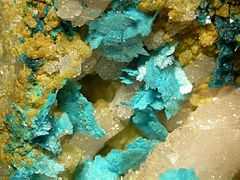Posnjakite
| Posnjakite | |
|---|---|
|
Posnjakite from Špania Dolina in Slovakia | |
| General | |
| Category | Copper minerals |
| Formula (repeating unit) | Cu4[(OH)6|SO4] • H2O |
| Strunz classification | 7.DD.10 |
| Dana classification | 31.4.1.1 |
| Crystal symmetry |
Monoclinic domatic H-M symbol: (m) Space group: Pm |
| Unit cell | a = 10.578 Å, b = 6.345 Å, c = 7.863 Å; β = 117.98°; Z = 2[1] |
| Identification | |
| Formula mass | 488.32 g |
| Color | Sky-blue to dark-blue |
| Crystal habit | Crystals scaly, or as crusts; earthy |
| Crystal system | Monoclinic |
| Mohs scale hardness | 2 to 3 |
| Luster | Vitreous |
| Refractive index | nα = 1.625 nβ = 1.680 nγ = 1.706 [1] |
Posnjakite is a hydrated copper sulfate mineral. It was discovered in the Tungsten deposit of Nura-Taldy[2] in Karaganda Region in Kazakhstan and described in 1967 by Aleksandr Ivanovich Komkov (1926–1987) and Yevgenii Ivanovich Nefedov (1910–1976)[3] and named after geochemist Eugene Valdemar Posnjak (1888–1949).[4]
Occurrence
Posnjakite is an uncommon but widespread secondary mineral in the oxidised zone of copper sulfide deposits, which may be of post-mine formation. It is associated with brochantite, langite, devilline, serpierite, woodwardite, wroewolfeite, aurichalcite, azurite, malachite and chalcopyrite.[2]
